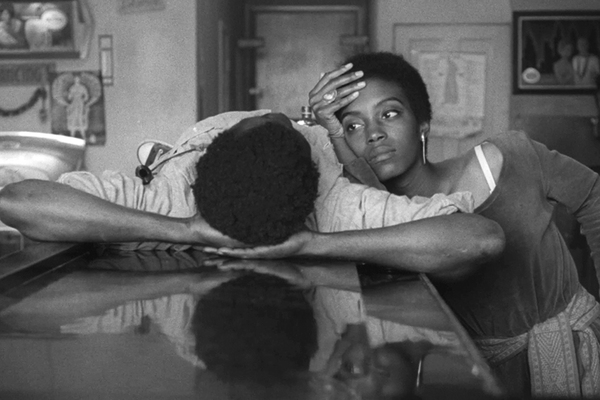Spotlight
Bushman
Posted on 16.10.2023
A film that seems to have come out of nowhere, a sad and ironic fable. In 1968, impressed by the cinéma-vérité style of Jean Rouch, American David Schickele (1937-1999), musician, actor and occasional filmmaker, decided to make a docu-drama about a young Nigerian fleeing the civil war who becomes a professor of African literature at the University of San Francisco.
It seems that classes have ended, so here is Gabriel, wandering around the city, bumping into a biker from Easy Rider, trying to deal with his visa problems and working on being the perfect boyfriend for his gorgeous girl, who dances to Aretha Franklin and teaches him the subtleties of the black accent, which he hasn’t quite mastered yet.

Bushman, 1971 © DR
Bushman shows, with a certain harshness, that Gabriel is a kind of attraction for his leftist friends, and ultimately for their girlfriends who see him as an exotic stallion - a situation that doesn't seem to embarrass him all that much... Then the story catches up with the characters, suddenly disregarding their roles, and the atmosphere hardens with the university strikes, organised by the Black Students' Union and the Third World Liberation Front. We won't reveal the twist that transforms the film, two-thirds into the story, but it shows that protests sometimes bring about the opposite of what they are seeking...
Completed in 1971, Bushman was lauded by the New York Times ("its mood is relaxed, tolerant, ironic, sophisticated - with an enjoyment of subtle complexities that seems, in its lack of stridency, post-revolutionary"). It also won over the Pesaro film festival, which was then devoted to young cinema. Subsequently, it vanished from screens until its recent restoration. Don't miss the protagonist’s faux casualness, and his way of mentioning serious and even tragic things without seeming to care.
A.F.
SCREENINGS
Bushman by David Schickele (1971, 1h15)
Lumière Terreaux – Monday, 16 October at 2.15pm
Cinéma Opéra – Friday, 20 October at 9.45pm
SCREENINGS

